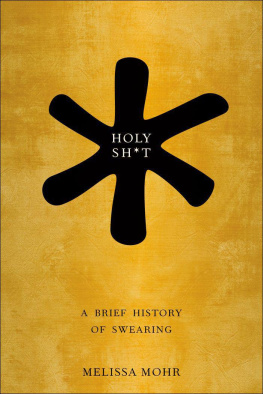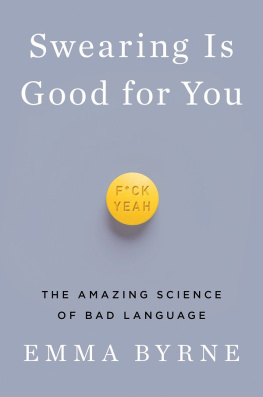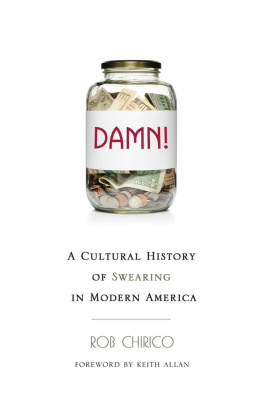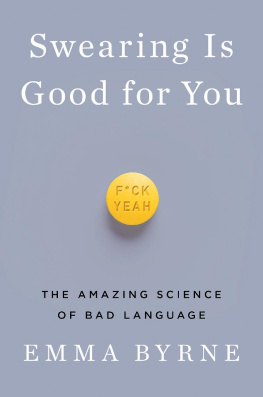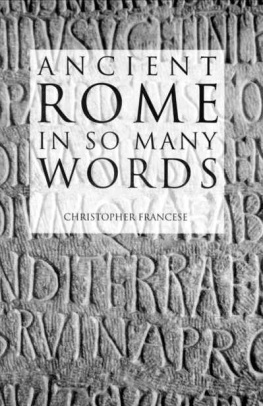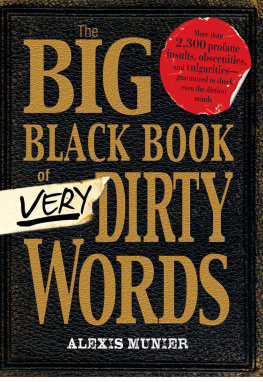HOLY SHIT
HOLY SHIT
A Brief History of Swearing
Melissa Mohr


Oxford University Press is a department of the University of Oxford. It furthers the Universitys objective of excellence in research, scholarship, and education by publishing worldwide.
Oxford New York Auckland Cape Town Dar es Salaam Hong Kong Karachi Kuala Lumpur Madrid Melbourne Mexico City Nairobi New Delhi Shanghai Taipei Toronto
With offices in Argentina Austria Brazil Chile Czech Republic France Greece Guatemala Hungary Italy Japan Poland Portugal Singapore South Korea Switzerland Thailand Turkey Ukraine Vietnam
Oxford is a registered trademark of Oxford University Press in the UK and certain other countries.
Published in the United States of America by Oxford University Press 198 Madison Avenue, New York, NY 10016
Melissa Mohr 2013
All rights reserved. No part of this publication may be reproduced, stored in a retrieval system, or transmitted, in any form or by any means, without the prior permission in writing of Oxford University Press, or as expressly permitted by law, by license, or under terms agreed with the appropriate reproduction rights organization. Inquiries concerning reproduction rights outside the scope of the above should be sent to the Rights Department, Oxford University Press, at the address above.
You must not circulate this work in any other form, and you must impose the same condition on any acquirer.
Library of Congress Cataloging-in-Publication Data Mohr, Melissa.
Holy shit : a brief history of swearing / Melissa Mohr.
p. cm.
Includes bibliographical references.
ISBN 978-0-19-974267-7
1. SwearingHistory. 2. English languageObscene wordsHistory. 3. English languageSlangHistory. 4. English languageSocial aspectsHistory 5. English languageHistory. I. Title.
PE3724.S85.M65 2013
417.2dc23 2012034513
1 3 5 7 9 8 6 4 2
Printed in the United States of America
on acid-free paper
To John Harington and Samuel Johnson
And to my husband
CONTENTS
I would like to thank Katie Boyle for her tremendous enthusiasm and all her work on my behalf. I would like to thank Tim Bent for his enthusiasm too, as well as his careful editing and his thoroughly useful suggestions of ways to improve this book. It seems to me that being an agent or an editor requires a certain amount of faithI thank them both for putting theirs in me.
Many people read drafts of this book or answered questions I had, and I thank them: J. N. Adams, Emily Allen-Hornblower, Marcia Blakenham, Dorothy Bray, Chloe Breyer, George Brown, Cressida Cowell, Edwin Craun, Mary Custic, Ben Faccini, Emily Faccini, Andrea Heberlein, Michal Ben-Josef Hirsch, Ron Hirsch, Ruth Mazo Karras, Simon Kirby, Diane Asadorian Masters, Tom Mohr, Monique Morgan, Stephen Orgel, Lawrence Poos, David Riggs, Carolyn Sale, Greg Scholl, and Linda Rabieh, who thought of the title.
Finally, I would like to thank my children for getting their heads around the idea that Mommy was writing a book about potty talk, and my husband, who cheerfully read draft after draft.
Writing this bookwhich spans more than four thousand years of history, give or take, and addresses everything from the Bible to poetry to legal cases to neuroscienceI very much felt the misgivings Samuel Johnson described when he set out the plan of his dictionary in 1747: I cannot hope, in the warmest moments, to preserve so much caution through so long a work, as not often to sink into negligence, or to obtain so much knowledge of all its parts as not frequently to fail by ignorance. I expect that sometimes the desire of accuracy will urge me to superfluities, and sometimes the fear of prolixity betray me to omissions: that in the extent of such variety, I shall be often bewildered; and in the mazes of such intricacy, be frequently entangled: that in one part refinement will be subtilized beyond exactness, and evidence dilated in another beyond perspicuity. Yet I do not despair of approbation from those who, knowing the uncertainty of conjecture, the scantiness of knowledge, the fallibility of memory, and the unsteadiness of attention, can compare the causes of error with the means of avoiding it, and the extent of art with the capacity of man; and whatever be the event of my endeavours, I shall not easily regret an attempt which has procured me the honour of your attention, my dear reader.
HOLY SHIT
It was the last word my grandmother ever said to me. She was suffering from advanced Alzheimers disease and didnt speak at all as I helped her eat her lunch or even when I showed her family photos. Im not sure she recognized me. When I took her for a walk outside in her wheelchair, though, she found her voice. I wheeled her over a crack in the sidewalk and her chair bumped. Out it cameShit! This from a woman who, even when she was feeling particularly frustrated, had rarely gone further than Nuts! or Darn it! She relapsed into silence for the rest of my visit.
In 1866, the French poet Charles Baudelaire was laid low by a stroke. He lost his ability to speak, he repeated so often that the nuns taking care of him threw him out of their hospital: Cr nom!short for sacr nom de Dieu. Today, the English equivalent to this would be the mild goddamn or damn, but in 1866 Cr nom! so unforgivably offended the nuns that they could explain Baudelaires outbursts only as the result of satanic possession.
Embedded deep within the brains of Baudelaire and my grandmother, remaining even when other language had been stripped away, were swearwords. Baudelaires swearing was a violation of religious taboo, taking Gods name in vain. My grandmothers violated taboos against mentioning certain body parts or bodily excretions and actions. Over the centuries these two spheres of the unsayablethe religious and the sexual/excremental, the Holy and the Shit, if you willhave given rise to all the other four-letter words with which we swear. A history of swearing is a history of their interaction and interplay. Sometimes the Holy has been the main source of swearwords, sometimes the Shit, and sometimes the two fields have joined in what we today would consider unusual combinationsobscene words shouted during religious rituals, for example. In the twenty-first century, we have an embarrassment of riches, and can choose words from both areas, as demonstrated by one precocious four-year-old at my sons nursery school, who responded to something his mother had said with Well, fuck me, Jesus!
Holy Shit is a history of swearing in English. It begins in a place where public buildings are covered with graffiti (If youre reading this, youre a faggot); where the most popular entertainers have the foulest mouths; where swearwords graphic enough to offend not very delicate sensibilities are heard on every street corner. This is not New York City. It is Rome, two thousand years ago. We start with ancient Latin, because the Roman idea of obscenitas guided the development of our own concept of obscenityalong with republicanism, the Julian calendar, and numerous literary classics, the Romans gave us a model for our use of obscene words. The Romans had a very different sexual schema than we do, however, which led to some fascinating differences between their obscene words and ours, as well see in . The Bible, in turn, gave us the Holy, and a model for our oath swearing. Such swearing is very important to God, who demands again and again that believers swear by him and him alone. In the Old Testament, God is fighting a war for supremacy with other Near Eastern gods, and he wields oath swearing as one of his most powerful weapons.
Next page
